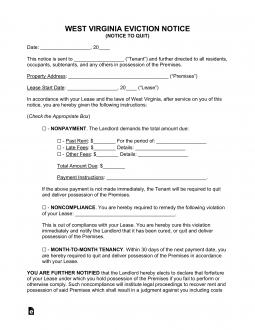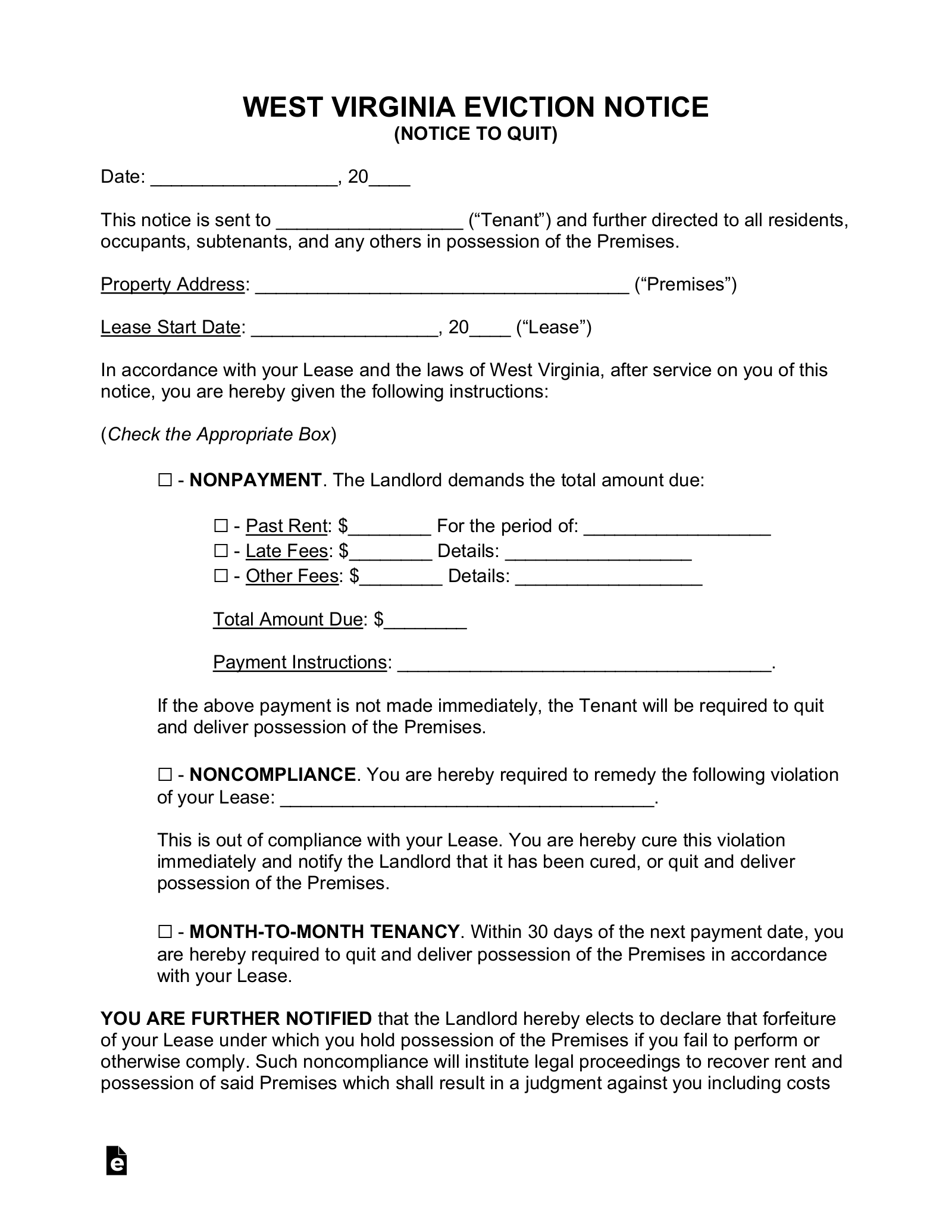Updated April 11, 2024
A West Virginia eviction notice is a document a landlord uses to inform a tenant of a lease violation. Under state law, the landlord is not required to give the tenant notice but is recommended for best landlord-tenant relationships. After issuing notice, if the tenant does not respond between five to seven days, the landlord should seek legal advice or file an eviction lawsuit in the local Magistrate Court.
By Type (2)
 Immediate Notice to Quit (Non-Payment/Non-Compliance/Illegal Activity) – West Virginia statutes do not require notifying the tenant about any lease violation. However, it is recommended that the tenant is notified before filing a petition in court. Immediate Notice to Quit (Non-Payment/Non-Compliance/Illegal Activity) – West Virginia statutes do not require notifying the tenant about any lease violation. However, it is recommended that the tenant is notified before filing a petition in court.
Download: PDF, MS Word, OpenDocument |
 30-Day Notice to Quit (Month-to-Month Tenancy) – This form may be used to inform a party to a month-to-month tenancy that the other party does not intend to renew the tenancy. 30-Day Notice to Quit (Month-to-Month Tenancy) – This form may be used to inform a party to a month-to-month tenancy that the other party does not intend to renew the tenancy.
Download: PDF, MS Word, OpenDocument |
Table of Contents |
Prohibited Landlord Actions
Utility Shutoff – While there are no explicit statutes that prohibit landlords from willfully interrupting a tenant’s utility services, this act is considered a “self-help eviction” and is illegal.
Changing the Locks – While there are no explicit statutes that prohibit landlords from changing the locks to block a tenant’s access to the premises, this act is considered a “self-help eviction” and is illegal.
Court Forms
Petition for Summary Relief – Landlords must file this petition to initiate a wrongful occupation lawsuit (eviction) against a tenant who has violated the terms of their lease.
Answer Form – Tenants will use this document after being served with a notice to appear in court. The form allows the tenant to admit to, or deny, the allegations made by the landlord.
Writ of Possession – If a landlord prevails in an eviction hearing, this court order will direct the sheriff to remove the tenant and return possession of the premises to the landlord.
How to Evict a Tenant (3 steps)
1. Notify Tenant About Breach
In West Virginia, a landlord does not need to notify the tenant if they are in default of the lease, whether through non-payment of rent or some other breach. The landlord can go straight to court and file an eviction proceeding. However, it is recommended that the landlord provide notice to the tenant about the breach and give them an opportunity to rectify the issue.
2. File Complaint in Court
The landlord may proceed to the Magistrate Court with jurisdiction in the area in which the property is located and file a Complaint, also known as a “Petition for Summary Relief – Wrongful Occupation.” The tenant will have to file an Answer by the time of the court hearing, which will be no more than 10 days from the filing.
3. Obtain Writ of Possession If Necessary
If the landlord prevails, the court will set a date for when the tenant must vacate the property. If the tenant still does not move out, the landlord may ask for a Writ of Possession from the court, which authorizes the sheriff to ensure the tenant leaves the property.


